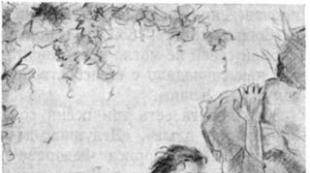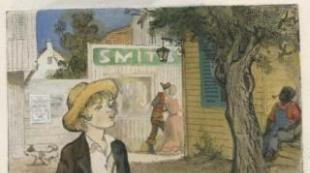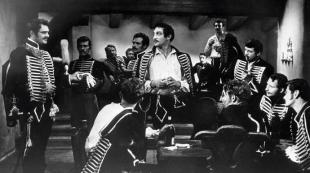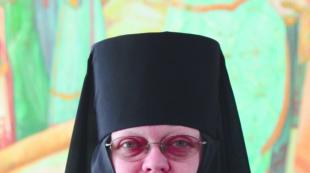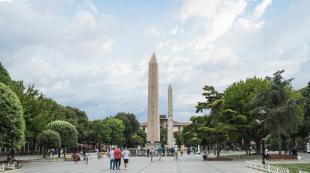The meaning of mtsyri in our time. The image of Mtsyri in Lermontov's poem of the same name (with quotes). The image of the main character in the work
Mtsyri is the main character of the poem of the same name by M. Yu. Lermontov, a Caucasian youth who ended up in a monastery against his will. From the Georgian language the hero’s name is translated as “novice.” Mtsyri was captured at the age of six. The Russian general entrusted him to a monk in the ancient city of Mtskheta, since the boy fell ill on the road and did not eat anything. The monk cured him, baptized him and raised him in a true Christian spirit. But life in the monastery became a kind of captivity for the boy. The mountain boy, accustomed to freedom, could not come to terms with this way of life. When Mtsyri grew up and was about to take monastic vows, he suddenly disappeared. He quietly escaped from the fortress to find his native land. The young man was missing for three days and could not be found. Then local residents of Mtskheta found him, half dead and wounded.
When Mtsyri was returned to the monastery, he refused to eat and at first did not want to tell anything. Then he nevertheless confessed to the elder who had saved him once in childhood. He told how happy he was outside the walls of the monastery, how he met a young Georgian woman on the way, how he fearlessly fought with a leopard and defeated him. Despite the fact that the young man grew up far from the wild, in his soul he always wanted to live like his mountain ancestors. He regretted that he never found his father’s land, did not see his native village at least from afar. All three days he walked east from the monastery in the hope that he was on the right path, but it turned out that he was walking in a circle. Now he was dying as a slave and an orphan.
Most of all, the character of the main character is revealed in his confession. He talks about the days of his absence not in order to confess or repent, and not in order to ease his soul, but in order to once again experience the feeling of freedom. It was so natural for him to be among the wild, as well as to live and breathe. When he returns to the monastery, his desire to live disappears. He does not blame anyone, but he sees the cause of his suffering in the long years of imprisonment. Having been in a monastery since childhood, he not only became weaker, but also lost the instinct inherent in every mountaineer to find the way home. Before his death, he asks to be buried in the garden, from where the Caucasus can be seen.
The young novice Mtsyri, living in a monastery in one of the Georgian valleys, is the main character of the romantic poem of the same name by M.Yu. Lermontov.
Disappointment in the surrounding reality and the absence of strong-willed people, Lermontov creates his own ideal, capable of real actions in non-standard life situations. He wanted to describe a strong and courageous man with clear life principles and a goal to which he goes despite all obstacles and is ready to give his life for it.
Characteristics of the main character-monk

The teenager ends up in the monastery as a child; here he is left behind by a passing Russian general, who took him prisoner in a distant mountain village. The boy is frightened and shy of everything, is in a very weakened physical state, but even then he is distinguished by a strong will and enormous inner dignity. The monks left him and he stayed to live with them, but his existence here was full of melancholy and pain, he was not happy. He considered the monastery walls a prison and just an annoying obstacle to the realization of his goal - to return to his homeland, to the country of his ancestors.
In the dead of night he escapes, a few days later the monks find him wounded, exhausted, almost dying. And although they make a lot of efforts to bring him back to life, recovery does not occur and the young man gradually fades away. It seems to everyone that he has lost something so important and valuable that he simply sees no point in living further. Before his death, he opens his soul to his mentor and his inner world opens before the reader, which helps to get to know the young man better and understand the reasons for his escape.

Having a wild and unbridled disposition, Mtsyri “child of the mountains” passionately desired a life “full of anxiety”; for him it was the embodiment of freedom, unity with the world around him, a way to test his abilities and character strengths. Endowed with a heightened sense of self-esteem, proud, like all the sons of the Caucasian people, the poor fellow dreamed of going to his homeland to become an independent and respected member of society there, and not an orphan without family and tribe.
Every step, every action in this new life outside of him brought the young man only happiness and pleasure, even if they were not always simple and joyful. And wild delight, and boundless admiration, and bitter disappointment - all of them were equally valuable and memorable for the inexperienced mountaineer, because he had never experienced anything like it.
His path was not simple and strewn with roses, he was haunted by fatigue, hunger and despair, but the strength of spirit and the desire to achieve his goal helped him overcome all difficulties and even defeat the ferocious mountain leopard. Exhausted by hunger and exhausted by difficulties, Mtsyri, thanks to the fearlessness and hot blood of his ancestors, managed to kill a well-fed and strong predator. Poisoned by the spirit of slavery, the courageous and brave young man returns to the place of his imprisonment and dies with thoughts of his distant and so desired Homeland.
The image of the main character in the work

The image of the main character Mtsyri is one of Mikhail Lermontov’s favorites; in those lines where he is described, one can feel sincere admiration and admiration for him; the author is close and understandable to his strong and persistent moral spirit, proud and independent character. Lermontov sympathizes with the fate of the main character, regrets that he cannot return to his father’s house.
For Mtsyri, the days he spent behind the monastery walls were the best in his life; he felt the taste of freedom and unity with nature. Then he could only count on himself, he was part of the huge world that he had so longed to see all his life. Finally, he became himself and found that part of himself that he thought he had lost forever. He finally stopped being a slave and felt like a free man, having a past and becoming the master of his future.

By creating the image of Mtsyri, Lermontov thus responds to the current state of affairs at that time, when in society all thoughts about freedom were suppressed and destroyed, people were afraid and they gradually degraded. Using the example of this work, the author shows us, on the one hand, a strong and courageous fighter, and on the other, the whole danger of such a position in society, which at any moment can lead to his death.
We will look at the image of Mtsyri in the poem by M.Yu. Lermontov. Mtsyri's poem describes the fate of a young novice imprisoned in a monastery against his will. Mtsyri's concepts and views are opposite to the conditions in which he lived his whole life. His love of life, desire for freedom, ardor of character contrast clearly with the religion of the monks, who deny not only the free human spirit, but also any earthly joys.
Mtsyri image of the main character
Mtsyri grew up among those who did not understand him. There was not a single person with whom he could have a heart-to-heart talk who would support him. But nothing could break this strong-willed young man. Despite the lack of like-minded people, he decided to escape. Escape in search of a homeland.
These few days of freedom occupy the main part of the work. The same as in Mtsyri’s soul. For maximum sincerity and emotionality, the author “handed over” the narrative into the hands of the hero.
Mtsyri, having finally found himself free, showed his strength and inflexibility of character. Not knowing at all where his homeland was, he still did not give up in spirit and searched.
True to his goal, he did not succumb to the temptation to follow the beautiful Georgian woman and continued his difficult path. Even in the last minutes of his life, Mtsyri did not deviate from his convictions and asked to be buried in the garden, in freedom.
When the author came up with the idea for this work, he himself was living in lockdown. Thus, through the hero, he expressed his thoughts, experiences, expressed indignation at limiting himself to boundaries, conventional or material.
The image of Mtsyri in the poem by M.Yu. Lermontov
What rating will you give?
 Essay: an episode of a fight with a leopard and its role in revealing the character of Mtsyri
Essay: an episode of a fight with a leopard and its role in revealing the character of Mtsyri  How does the image of the twelve Red Army soldiers change in A. Blok’s poem “The Twelve”?
How does the image of the twelve Red Army soldiers change in A. Blok’s poem “The Twelve”?
M.Yu. Lermontov loved the theme of the Caucasus. He was delighted by the views and beauty of these lands. He tried to put and convey his love for these places into the work, and the romantic element added a special flavor to the poem. The image and characterization of Mtsyri is key and plot-forming. The protagonist's loneliness and longing for his native place push him to escape. Risking his life, he leaves the walls of the monastery with the sole purpose of returning home. Mtsyri is the embodiment of human dignity. An example of true courage and selfless courage.
Image and characteristics
It was not of his own free will that Mtsyri ended up in the monastery. He was captured as a small child. At that time he was only 6 years old. The Russian general decided that he would be better off here, without even realizing what a tragedy his, as he believed, noble deed would turn out to be.
Child of the mountains Mtsyri was born in the Caucasus. He lived with his family in the village until he was six years old.
The image of my father remains in my memory to this day. It is known that the man fought.
"My father? He appeared to me as if alive in his combat clothes, and I remembered the ringing of chain mail and the shine of the gun...”
Patient. Proud. As a child, he showed willpower and tenacity of character. He endured the pain when he was sick without making a sound.
“Even a weak groan did not come out of the child’s lips; he rejected food with a sign and died quietly, proudly.”
The will beckoned, exciting the imagination. Monastic life is akin to captivity. The soul was torn from captivity. This life is not for him. He would give everything in the world for a couple of minutes spent with his family.
“I lived little, and lived in captivity. These are two lives for one, but I would only exchange one full of anxiety if I could...”
Loves nature. The days spent in freedom will be remembered forever. They are the happiest. He admired nature. I caught sounds, understood them, felt beauty and harmony. He failed to do this among human society. Communication with her helped to drown out the longing for my native village. The element is a kindred spirit for him.
“As a brother, I would be glad to embrace the storm.”
Purposeful. The dream of escaping from captivity has been brewing for a long time.
“A long time ago I decided to look at the distant fields. Find out if the earth is beautiful. Find out whether we are born into this world for freedom or prison.”
The young man was waiting for the right opportunity. This incident was the day when a terrible storm began. For the sake of freedom, he is ready to do anything: overcome difficulties, fight the elements, endure hunger, thirst, scorching heat. Even the girl he met at the pond could not disrupt his plans, although the hero clearly felt sympathy for her. The light of the saklya where she lived beckoned him, but Mtsyri threw away the thought of looking inside, remembering what purpose he was pursuing and for what. He chose the long-awaited freedom over love. Faced with a choice, I did not give in to temptation.
Fearless. In a mortal battle with a predator, he proved himself to be a real hero. Knowing that the forces were unequal, he entered into a fight with the wild beast. The wounds received in battle could not stop the young man. He moved forward steadily. I didn’t know the way, I was exhausted.
“He rushed at my chest, but I managed to stick my gun into my throat and turn my gun twice... He howled.”
Lonely. I'm gloomy in life. Life in lockdown has made him so unsociable. He is unaccustomed to communication. People were strangers to him.
“I myself, like an animal, was alien to people.” “Gloomy and lonely, a leaf torn off by a thunderstorm...”
Thirst for self-knowledge. Mtsyri longed to know himself. I managed to implement my plans once I was free.
“Do you want to know what I did when I was free? I lived - and my life without these three blissful days would have been sadder and gloomier than your powerless old age.”
Mtsyri was unable to hug her family. On his deathbed, he did not at all repent of his committed act. The young man was absolutely sure that he acted correctly. Please bury your last words in the garden, away from the hated walls. This confirms that he did not intend to change his beliefs and his principles.
“I will drink in the radiance of a blue day for the last time. The Caucasus is visible from there! Perhaps he will send me farewell greetings from his heights, send them with a cool breeze...”
Article menu:
The poem “Mtsyri” was one of M.Yu.’s favorite works. Lermontov, according to the memoirs of his contemporaries, the poet loved to read the text of the poem in public and knew it all by heart.
Basis of the poem
Poem by M.Yu. Lermontov's Mtsyri is based on a true story about a young monk who spent his entire life in a country foreign to him.
While in exile in the Caucasus, Lermontov meets a young monk living in Mtskheta. The monk told Mikhail Yuryevich his difficult fate: his little one was taken away from his native land and he was forced to spend his whole life in a part foreign to him.
Lermontov’s first ideas for implementing the theme of monasticism in the literary field arose back in 1831. The poet wanted to embody what he heard in the monk’s notes. Later, this idea, under the influence of the story of a monk from Mtskheta, was embodied in the poem “Mtsyri”.
Elements of autobiography
Many researchers of Lermontov’s literary heritage, in particular his poem “Mtsyri,” note a certain similarity between the young monk of the poem and M.Yu. Lermontov.
Belinsky argued that the poem exposes the author himself. The destinies of the author and the monk, despite their apparent differences, have a common basis. Loneliness and isolation from family are what these individuals have in common. Like Mtsyri, Lermontov grew up far from his relatives (the grandmother who raised him did her best to prevent him from communicating with relatives, in particular his father). This state of affairs became the cause of despondency both in the life of Lermontov and in the life of Mtsyri. In addition, they are also related by the Caucasus: for both Mtsyri and Lermontov, it became the embodiment of freedom.
Life path of Mtsyri
When Mtsyri was 6 years old, a tragedy happened in his life - a certain Russian general took the boy prisoner - thus, Mtsyri forever left his home, his family and the village dear to his heart - the village. On the way, the boy falls ill - separation from loved ones and a difficult long road provoked this condition. One of the monks took pity on the child and took him to the monastery: “out of pity, one monk looked after the sick man, and he remained within the guardian walls, saved by friendly art.”

Despite the disappointing forecasts, Mtsyri survived and soon turned into a handsome young man. He learned the unfamiliar language that was spoken in this area, learned about the customs and peculiarities of life in this region, but he never managed to get rid of longing for his family and his home.
Languishing in despondency, Mtsyri makes attempts to escape and find his native village, but his intentions were not destined to come true.
Lermontov describes in detail Mtsyri's last escape - during a thunderstorm, the young man leaves the walls of the monastery - for three days he wanders along the paths in the hope of finding the right path home, but fate is extremely unkind to him - such a promising path becomes a tragedy - after a fight with a leopard, the young man's strength has noticeably decreased, This was facilitated by the wounds received in the battle; in the end, the path leads Mtsyri to the same monastery. Realizing all the hopelessness, the young man dies under the influence of his wounds and general despondency.
Characteristics of personal qualities
Mtsyri became a monk by coincidence. Until the age of six, he was not filled with the desire to devote his life to serving God, and in particular, he knew nothing about Christianity. Only after he entered the monastery was he baptized.
Like all romantic heroes, Mtsyri has a special relationship with nature, in particular with the Caucasus mountains.
Life in a monastery, enclosed by bare, cold walls, has a depressing effect on him. Lermontov does not talk in detail about the attitude of other monks towards Mtsyri, but, based on their general mood, it can be assumed that it did not go beyond the bounds of decency - the monks were kind to the stranger who grew up within the walls of their monastery, but they were not able to understand his spiritual groaning .
Mtsyri belongs by origin to the mountain peoples and, like his father, he was very proud in childhood: “He refused food, and died quietly, proudly,” and did not lose this characteristic in his youth: “And, having listened proudly, the sick man stood up, having gathered the rest of my strength."
Mtsyri's life is full of sad longing and the desire to find lost happiness: “I wandered silently, alone, looked, sighing, to the east, tormented by an unclear longing for my native land.”
He was always a kind person and “did no harm to anyone.” He is a pure-hearted person, like a “child.” However, life in a monastery far from his homeland weighs heavily on him. The monks are not able to understand such melancholy of a young monk, since they themselves have never experienced it. Monks are alien to attachment to nature and freedom, they are afraid of thunderstorms, considering it the creation of God, while Mtsyri has no fear of this natural phenomenon at all - he is a child of nature and a thunderstorm, like any natural phenomenon, is something close and natural for him , therefore, within the walls of the monastery Mtsyri “was forever alien to them, like a steppe beast.”

All Mtsyri’s dreams and desires came true around gaining freedom and happiness. He wants to live freely, like in childhood. For this purpose, he escapes from the monastery. Since Mtsyri has never traveled, he goes at random, guided by the view of the mountains. An unexpected meeting with a leopard began to ruin his plans. The young man had no choice but to engage in battle with a wild beast. During the fight, Mtsyri was brave and strong. He would make an excellent warrior. He defeats the leopard: “He rushed to my chest; but I managed to stick my weapon into my throat and turn my weapon twice.”
Dear readers! We invite you to follow the story “Hero of Our Time” by Mikhail Yuryevich Lermontov.
The wounded Mtsyri moves further and further away from the mountains and soon comes to the outskirts of the monastery. Discouraged, he loses consciousness, the monks who find him take him to the walls of the monastery, which for many years was a prison for Mtsyri. The young man realizes that his cherished dream will never come true - he will die on a foreign land: “Only one thing saddens me: my corpse is cold and dumb and will not smolder in my native land.”
Thus, in the poem “Mtsyri” by M.Yu. Lermontov portrayed the image of a man who was not able to withstand the difficulties of life and find happiness. Mtsyri always had a childish, pure soul, he was a kind person, although at the same time, gloomy and unsociable, but the reason for such gloominess was his mental anguish from separation from his natural environment and home.
